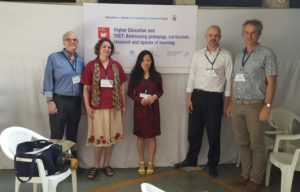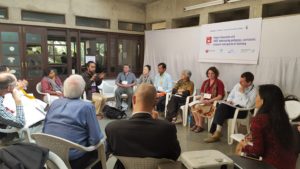I am thrilled that the 2018 AASHE Conference & Expo theme is: Global Goals: Rising to the Challenge. When the Sustainable Development Goals (SDGs) were adopted by world governments in September 2015, sustainability education leaders and advocates were inspired and encouraged. We have spent many years trying to elevate the work of higher education in achieving a sustainable future, including sponsoring the Higher Education Sustainability Initiative (HESI) at the UN’s Conference on Sustainable Development, aka Rio+20, in 2012. Having represented AASHE at Rio+20, I am heartened by these next great steps which will help achieve AASHE’s work to support sustainability in higher education by ensuring that our world’s future leaders are motivated and equipped to solve sustainability challenges.
While the 17 SDGs offer an incredible set of aspirational and integrated goals, with 169 targets to end poverty, protect the planet, and ensure prosperity for all by 2030, education for sustainable development (ESD) was sidelined in some ways by being buried in Target 4.7:
By 2030, ensure that all learners acquire the knowledge and skills needed to promote sustainable development, including, among others, through education for sustainable development and sustainable lifestyles, human rights, gender equality, promotion of a culture of peace and non-violence, global citizenship and appreciation of cultural diversity and of culture’s contribution to sustainable development.
Embedded within Goal 4: “Ensure inclusive and equitable quality education and promote lifelong learning opportunities for all,” this list of ESD outcomes strives for global solutions and expects much from practitioners. There is great irony that none of the SDGs can be achieved without education.
 Consequently, in January, 2016, over 750 participants from 22 countries gathered together in Ahmedabad, India, at the Center for Environmental Education, at the international conference, ‘Education as a Driver for Sustainable Development Goals’, to drill down and explore how formal, nonformal and informal education can help be an engine for the Global Goals. Each team of experts considered how curriculum, faculty development, research, workforce training, public awareness campaigns and more could help achieve the SDGs. Goal 4 alone had seven groups exploring how their areas of education could help create a sustainable future.
Consequently, in January, 2016, over 750 participants from 22 countries gathered together in Ahmedabad, India, at the Center for Environmental Education, at the international conference, ‘Education as a Driver for Sustainable Development Goals’, to drill down and explore how formal, nonformal and informal education can help be an engine for the Global Goals. Each team of experts considered how curriculum, faculty development, research, workforce training, public awareness campaigns and more could help achieve the SDGs. Goal 4 alone had seven groups exploring how their areas of education could help create a sustainable future.
- ESD for Transforming Formal Education (School Systems)
- Early Childhood Development, Care and Pre-primary Education: Cornerstone for achieving SDGs
- Higher Education and TVET: Addressing pedagogy, curriculum, research and spaces of learning
- Empowering Youth for a Sustainable Future – Youth Empowerment and SDGs
- Enable Teachers, Enable Learning
- Youth-led Monitoring of SDG 4.7: Youth as Game Changers of Data Revolution for SDGs
- Environmental Education, Ethics and Action: Re-imagining critical skills for sustainable lifestyles and global citizenship
 Each team created a valuable list of recommendations to help inform these efforts, lists that can help others around the world to achieve Agenda 2030. Plus, the overall conference outcome document, the Ahmedabad Plan of Action, offers even more clarity on how “education and all institutions involved in sustainable development need to urgently transform to act accordingly in a sustainable world.”
Each team created a valuable list of recommendations to help inform these efforts, lists that can help others around the world to achieve Agenda 2030. Plus, the overall conference outcome document, the Ahmedabad Plan of Action, offers even more clarity on how “education and all institutions involved in sustainable development need to urgently transform to act accordingly in a sustainable world.”
As 2018 AASHE Conference & Expo attendees prepare to explore how we can rise to the challenge to reach the Global Goals, it would behoove us all to consider how others are developing this work around the world. In my own session, “Education as the Engine for the Global Goals“, the recommendations for higher education will receive particular focus. From our individual work in courses or with students to campus operations and institutional change, all of our work matters.
As we practice at my own institution, Portland Community College, it is important to remember our sustainability motto: “We are all in this together.” This lesson reminds us that we are not individually responsible for all of the solutions, but, together, collaboratively, we each have contributions to offer which can make a difference. We are the fuel, we are the engine, each offering a part that moves the system forward. Whether formally or informally, our classes, our workshops, our service-learning projects, and our signs in the cafeteria or on recycling bins are all part of the educational process which can help achieve the Global Goals.
How are you a part of this mission? This movement? We will come together in Pittsburgh, PA, in October, because we care. We want to make a difference through sustainability education. We need hope and we need to feel empowered. I find great solace in knowing that good people are doing good work around the world. Will we be able to achieve Agenda 2030 and the Global Goals? We certainly will not if we do not try. Therefore, it helps to have a vision for a better future and a roadmap for how to get there.
Want to learn more? Interested in exploring more about how others around the world advance sustainability? Join us for the Education as the Engine for the Global Goals session at the 2018 AASHE Conference & Expo – Thursday, October 4, 2:45 – 3:45 p.m.